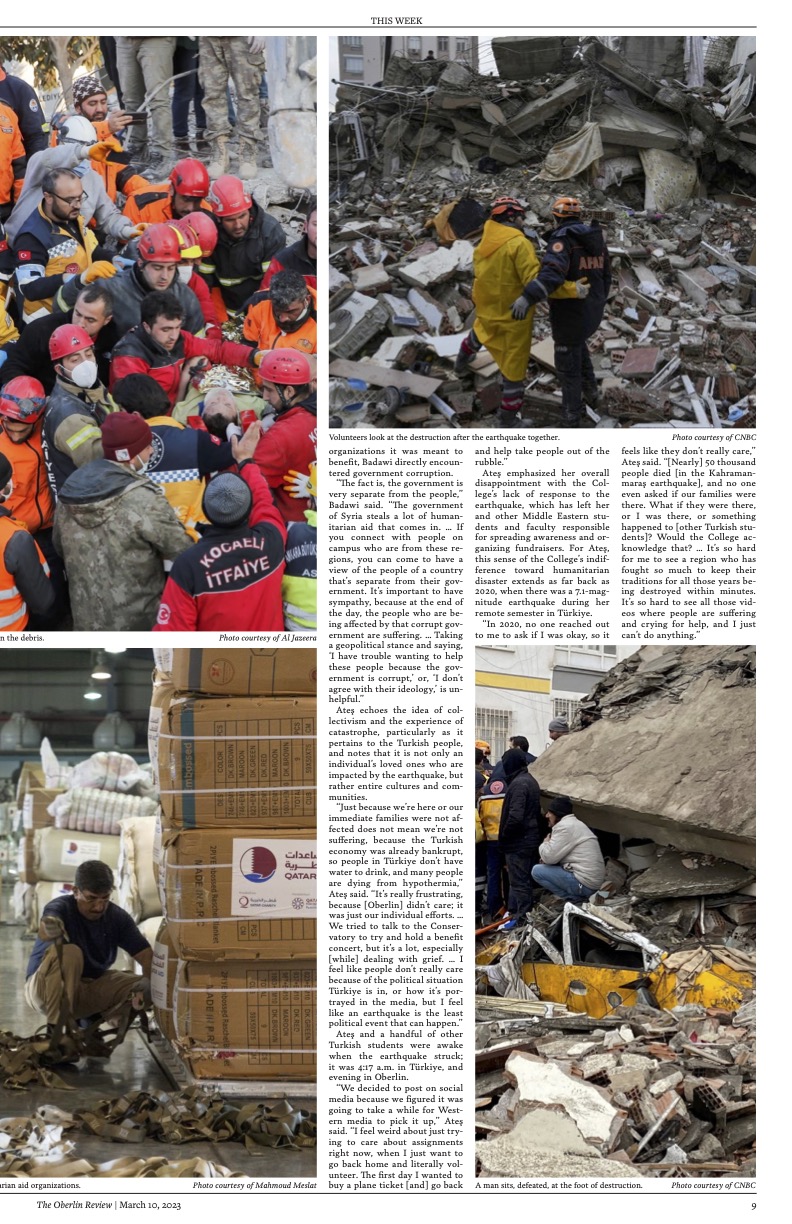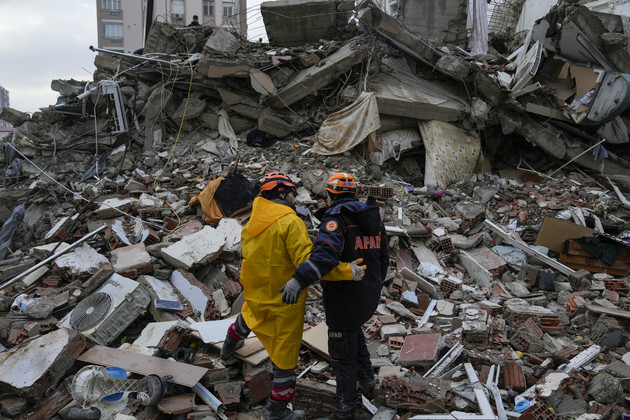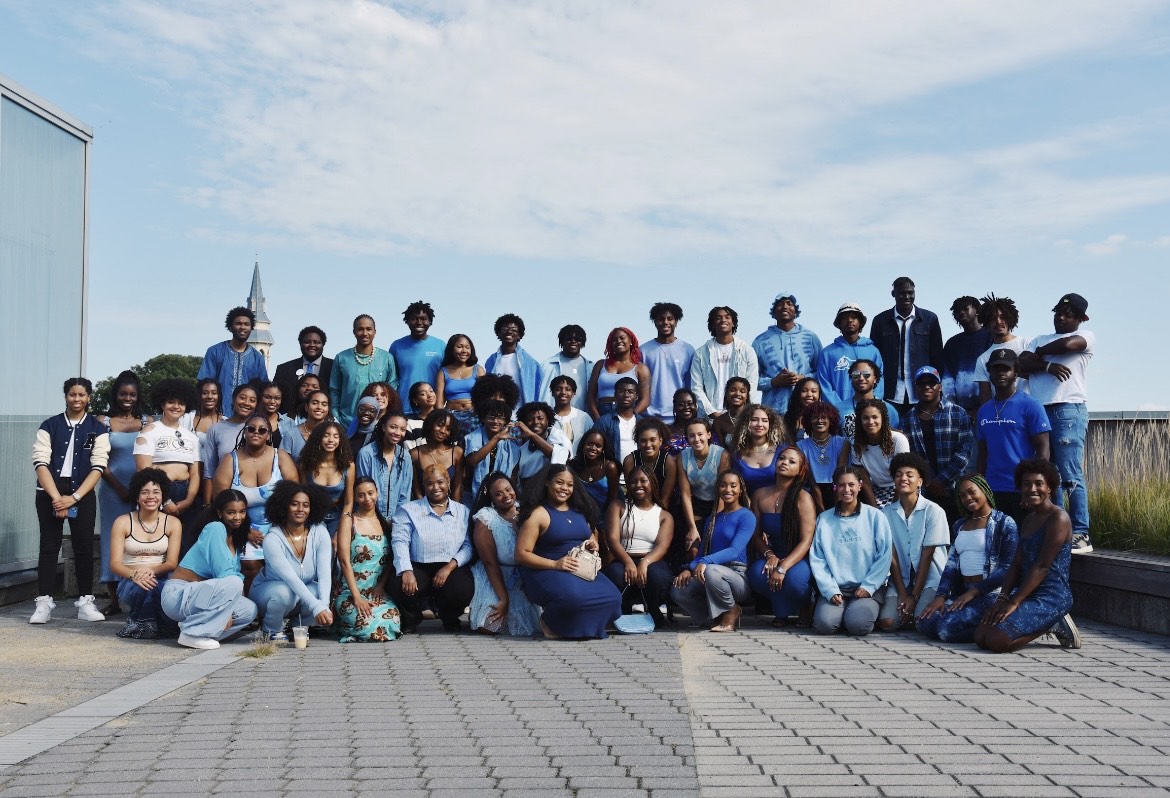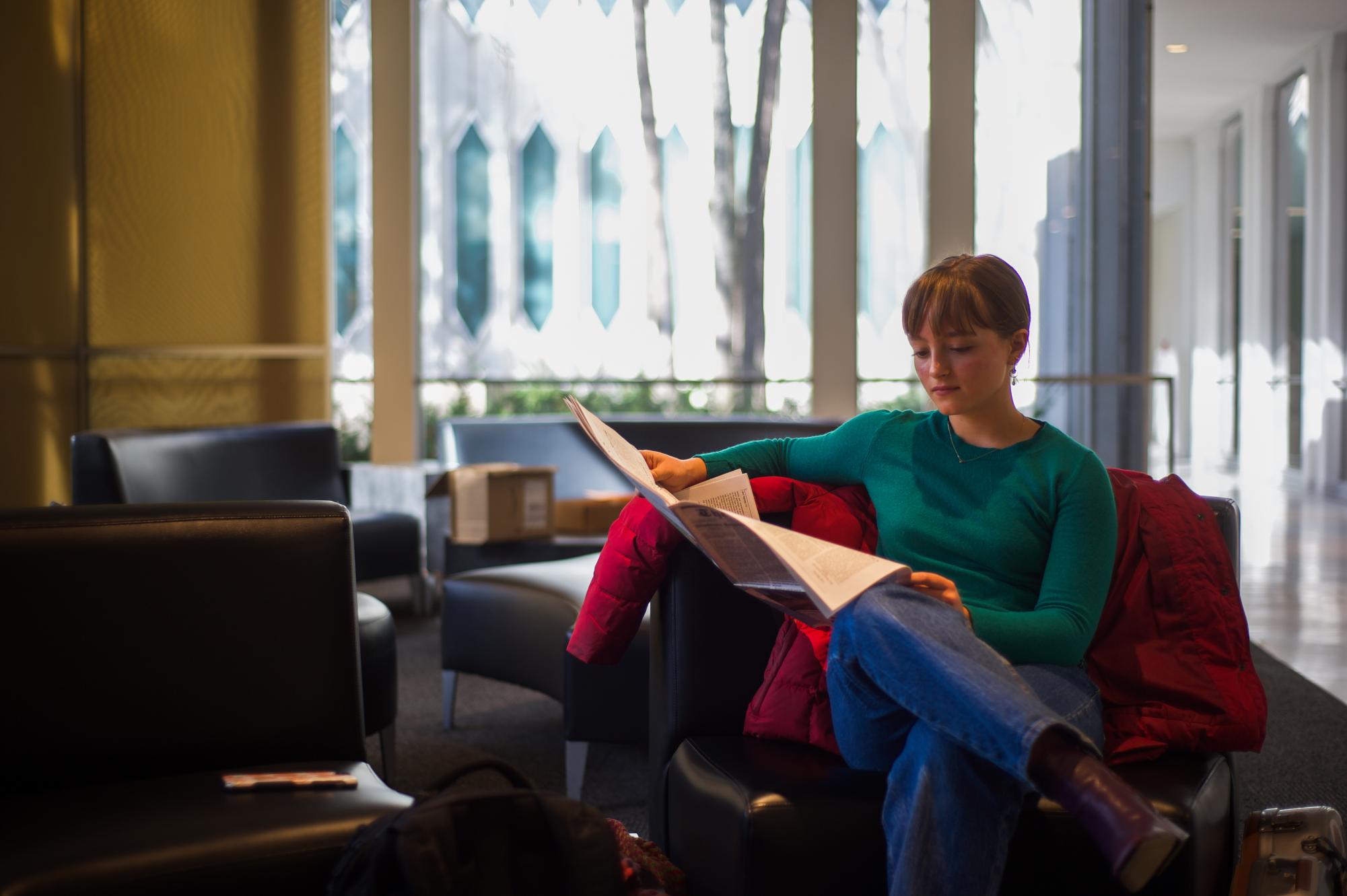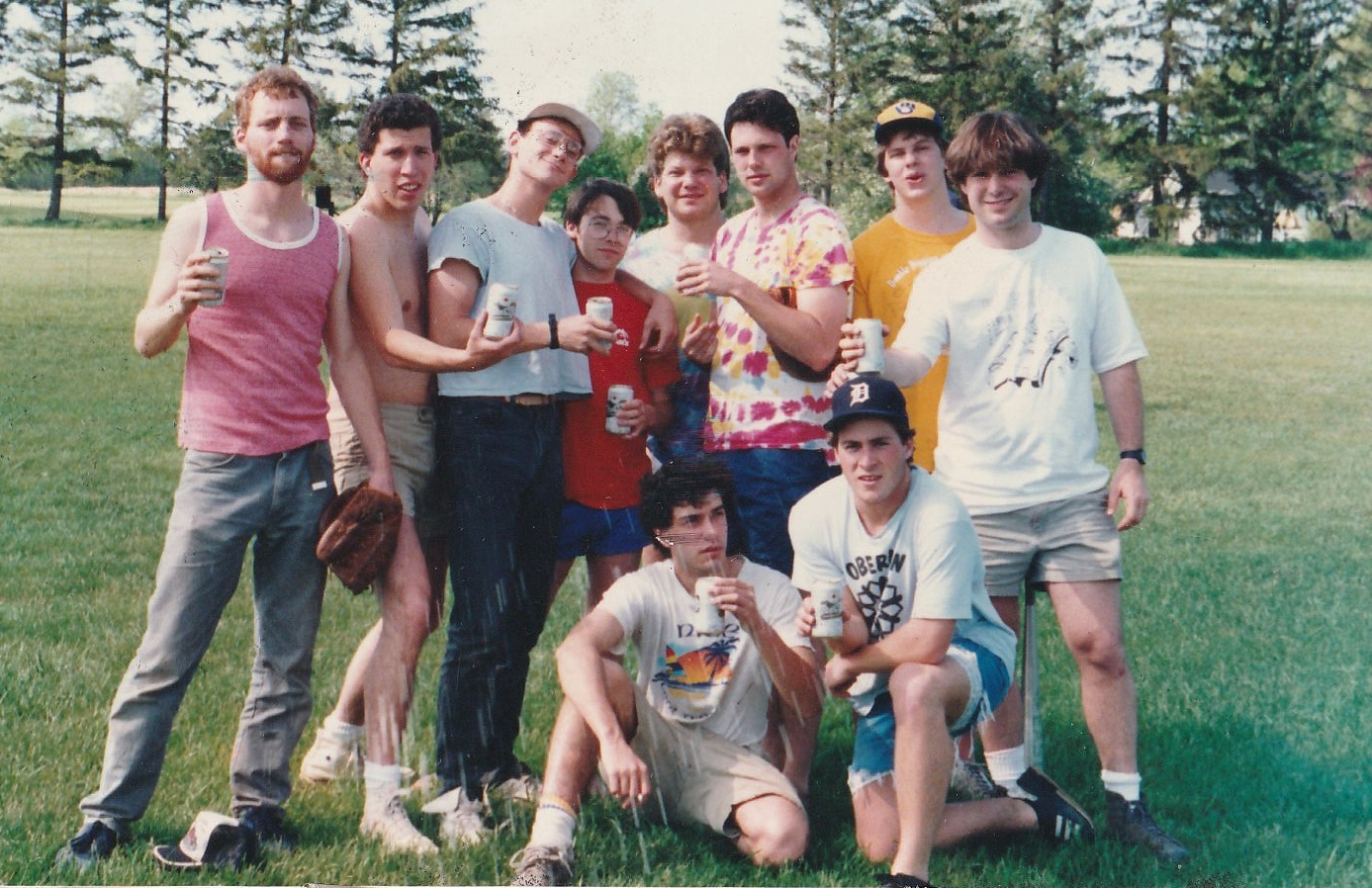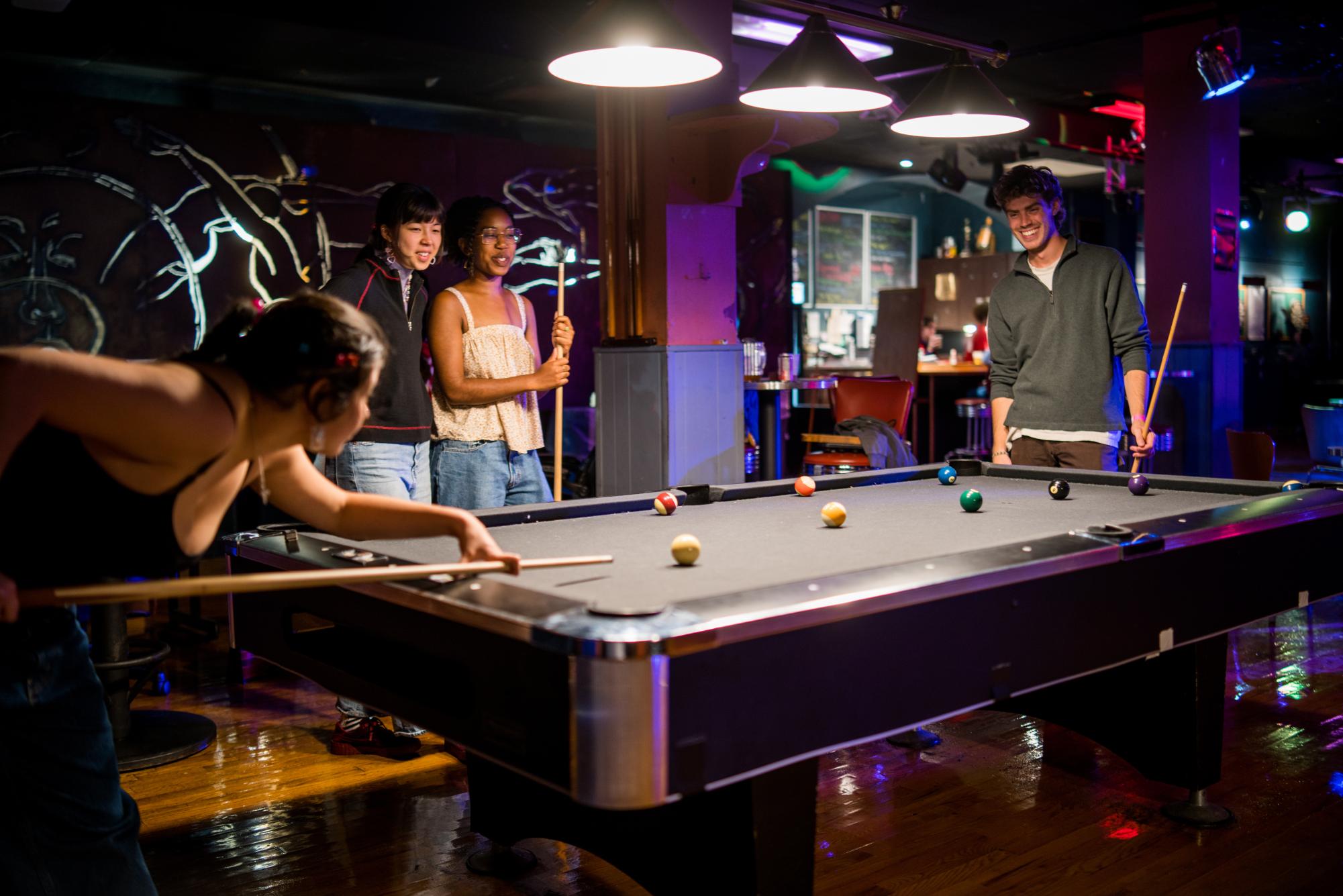Aftermath of Earthquake in Türkiye, Syria Humanitarian Concern, Not Political
Volunteers look at the destruction after the earthquake together.
Editors’ Note: This article contains references to and images of events and grief that may be upsetting or triggering for some readers.
Türkiye and Syria are in no way perfect countries, a sentiment shared by their citizens. Both nations are often characterized by tyrannical political regimes. However, in the aftermath of the Kahramanmaraş earthquake, attention to humanitarian issues and the lives of the people impacted take precedence over politics. The earthquake did not just destroy buildings, it devastated the lives and culture of Turkish and Syrian people.
It has been over one month since the earthquake, with a death toll surpassing 45,000 in Türkiye and 5,900 in Syria as of March 1. There have also been 10,000 aftershocks reported in the three weeks following the initial earthquake.
The Oberlin population is not unaffected by casualties. Mahmoud Meslat, visiting instructor of Arabic who has taught at Oberlin for the last 12 years, is Syrian-American. His humanitarian efforts, alongside those of his friends, family, and colleagues, all come from his same core belief: In times of crisis, politics must take a back seat.
“There is no place for politics when it comes to human dignity, … to taking care and making a difference in a child who lost his or her dad and mom, [or] when we look at how many people are suffering now,” Meslat said.
He has also worked with the U.S. government to temporarily lift sanctions against Syria.
“Sometimes, regulations and obstacles are like a fence in front of us, so we can’t move anywhere,” Meslat said. “I tell [the U.S.], ‘You have to lift this sanction, let’s get those victims out of the rubble, let us bury our loved ones instead of them staying buried in cities.’ [The U.S. tries], but sometimes that takes time … by the time they get there, it’s too late for a lot of people because they have to be there [within] 24 to 48 hours to save lives.”
Meslat’s family also conducts philanthropic work in Syria, where they are housing nearly 60 orphaned children.
“We cook for them, provide shelter for them [in] one of my grandfather’s big houses,” Meslat said. “We try our best to make rooms [and] beds, trying to have blankets and clothing for them, as much as we can. … I am grateful for a lot of support — those children need care [and] family, and we get to be their family. Whatever it takes, me and my family are going to be parenting those kids, some of whom are one year old. It’s a very sad situation, but it’s a good cause — if I can make a difference anywhere, I will.”
Despite Syria’s tumultuous political history, Meslat views the earthquake almost as a unifier among Syrian people, because its scope extends beyond political matters into questions of how to save as many lives as possible.
“I wanted to send a voice to tell the children of Syria, all the people of Syria, that we are with you and we will not forget about you,” Meslat said. “We will do everything that we can to make sure that your suffering is heard by the administration, by local political figures, by the churches, by the mosque, by the synagogue, because we all unify here when it comes to tragedy like this. I am grateful to a lot of religious leaders in the community who reach out and call asking me about my family — if they are safe, if they are okay.”
Meslat is not the only member of the Oberlin community working to help Turkish and Syrian citizens. College second-year Zane Badawi, who is Palestinian and co-chairs the Muslim Students Association, and College fourth-year Ada Ateş, who is an international student from Türkiye, have worked tirelessly alongside several other students to raise awareness and send aid.
Badawi worked with the MSA Feb. 23 and 24 to co-sponsor a bake sale with Students for Free Palestine to raise funds for Doctors Without Borders Syria, Rahma, Ahbap, and AKUT Search and Rescue Association. In the process of sending proceeds from the fundraiser to the organizations it was meant to benefit, Badawi directly encountered government corruption.
“The fact is, the government is very separate from the people,” Badawi said. “The government of Syria steals a lot of humanitarian aid that comes in. … If you connect with people on campus who are from these regions, you can come to have a view of the people of a country that’s separate from their government. It’s important to have sympathy, because at the end of the day, the people who are being affected by that corrupt government are suffering. … Taking a geopolitical stance and saying, ‘I have trouble wanting to help these people because the government is corrupt,’ or, ‘I don’t agree with their ideology,’ is unhelpful.”
Ateş echoes the idea of collectivism and the experience of catastrophe, particularly as it pertains to the Turkish people, and notes that it is not only an individual’s loved ones who are impacted by the earthquake, but rather entire cultures and communities.
“Just because we’re here or our immediate families were not affected does not mean we’re not suffering, because the Turkish economy was already bankrupt, so people in Türkiye don’t have water to drink, and many people are dying from hypothermia,” Ateş said. “It’s really frustrating, because [Oberlin] didn’t care; it was just our individual efforts. … We tried to talk to the Conservatory to try and hold a benefit concert, but it’s a lot, especially [while] dealing with grief. … I feel like people don’t really care because of the political situation Türkiye is in, or how it’s portrayed in the media, but I feel like an earthquake is the least political event that can happen.”
Ateş and a handful of other Turkish students were awake when the earthquake struck; it was 4:17 a.m. in Türkiye, and evening in Oberlin.
“We decided to post on social media because we figured it was going to take a while for Western media to pick it up,” Ateş said. “I feel weird about just trying to care about assignments right now, when I just want to go back home and literally volunteer. The first day I wanted to buy a plane ticket [and] go back and help take people out of the rubble.”
Ateş emphasized her overall disappointment with the College’s lack of response to the earthquake, which has left her and other Middle Eastern students and faculty responsible for spreading awareness and organizing fundraisers. For Ateş, this sense of the College’s indifference toward humanitarian disaster extends as far back as 2020, when there was a 7.1-magnitude earthquake during her remote semester in Türkiye.
“In 2020, no one reached out to me to ask if I was okay, so it feels like they don’t really care,” Ateş said. “[Nearly] 50 thousand people died [in the Kahramanmaraş earthquake], and no one even asked if our families were there. What if they were there, or I was there, or something happened to [other Turkish students]? Would the College acknowledge that? … It’s so hard for me to see a region who has fought so much to keep their traditions for all those years being destroyed within minutes. It’s so hard to see all those videos where people are suffering and crying for help, and I just can’t do anything.”
